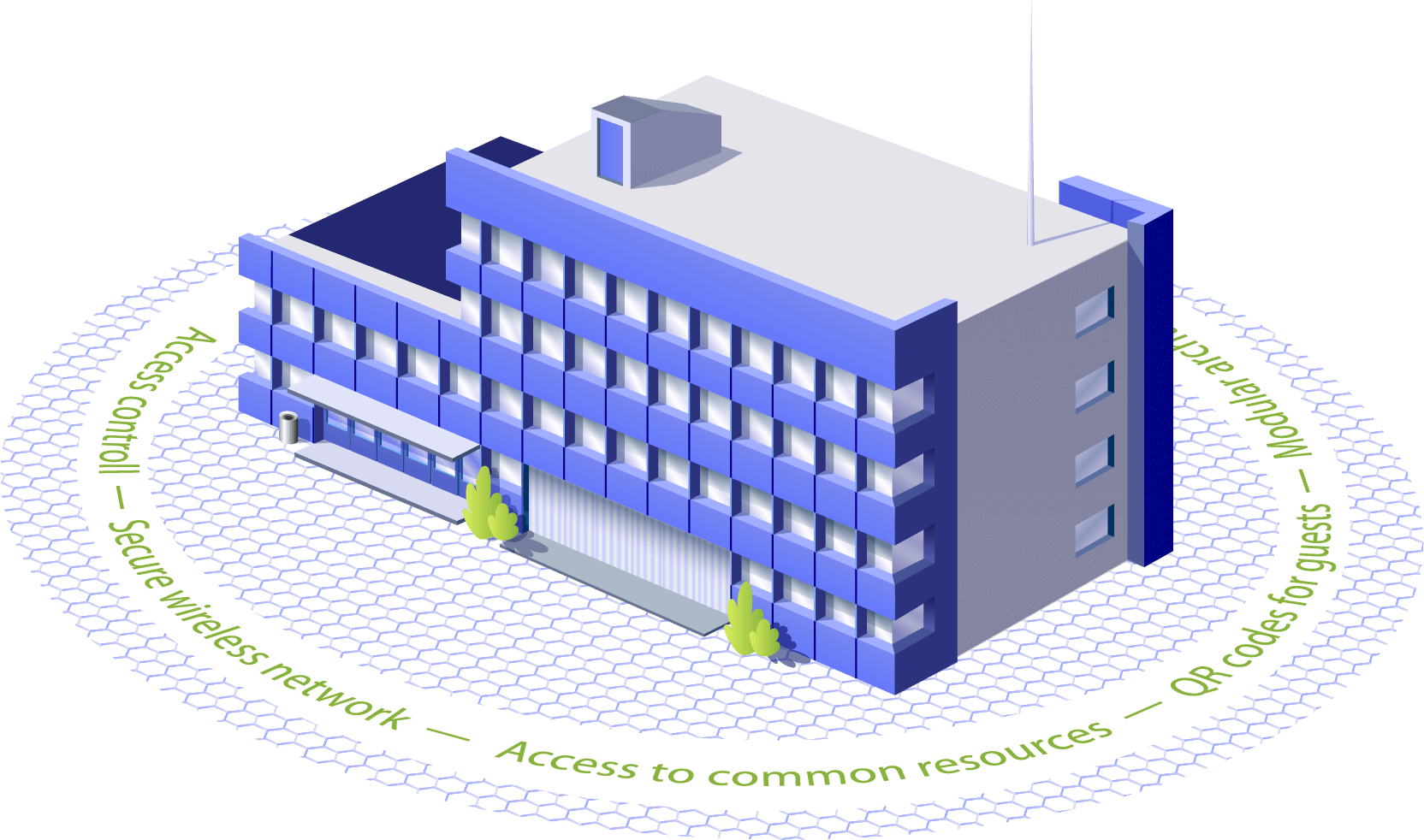Operation Support Cloud
OSC is a cloud-based platform with easy and secure administration with focus on self-service and positive user experience — way that offers the best value to the building owner and users alike.
Even in a small company of up to 50 workstations, it would be difficult to manage digital certificates manually. Certificates have to be not only installed, but also revoked or renewed in time before expiration.
OSC is a cloud-based platform with easy and secure administration with focus on self-service and positive user experience — way that offers the best value to the building owner and users alike.

INFOSS has developed a full solution for providing secure VPN access to company’s network for employees from any place with Internet connectivity.
Secure access to the company’s network for your employees.
Perfect solution for small- and medium-sized companies.
We offer solutions for Apple iOS, OS X, Android, Cisco IOS, Linux, FreeBSD and Windows
We are proud to serve telecom and ISP operators, with added value, in everyday business. With our INFOSS secure mail solution, you are guarantee secure vpn mail, between you mobile device and your e-mail provider. Ask your current e-mail provider if they provide INFOSS secure mail.
We offer solutions for Apple iOS, OS X, Android, Cisco IOS, Linux, FreeBSD and Windows
A public-key infrastructure (PKI) is a system for the creation, storage, and distribution of digital certificates which are used to verify that a particular public key belongs to a certain entity. The PKI creates digital certificates which map public keys to entities, securely stores these certificates in a central repository, and revokes them if needed.
We offer solutions for Apple iOS, OS X, Android, Cisco IOS, Linux, FreeBSD and Windows
Our solutions introduce the capability to automatically enroll users and computers with certificates, including smartcard-based certificates.
Using the autoenrollment feature, organizations can manage the certificate lifecycle for users.
We offer solutions for Apple iOS, OS X, Cisco IOS and Windows
A security audit is a systematic evaluation of the security of a company's information system by measuring how well it conforms to a set of established criteria.
A thorough audit typically assesses the security of the system's physical configuration and environment, software, information handling processes, and user practices.
We offer solutions for Apple iOS, OS X, Android, Cisco IOS, FreeBSD and Windows
Mobile Device Management (MDM) software secures, monitors, manages and supports mobile devices deployed across mobile operators, service providers and enterprises. MDM functionality typically includes over-the-air distribution of applications, data and configuration settings for all types of mobile devices, including mobile phones, smartphones, tablet computers, ruggedized mobile computers, mobile printers, mobile POS devices, etc.
This applies to both company-owned and employee-owned (BYOD) devices across the enterprise or mobile devices owned by consumers.
We offer solutions for Apple iOS and Android
To secure a Web server, you must apply many configuration settings to reduce the server's vulnerability to attack. So, how do you know where to start, and when do you know that you are done?
We offer solutions for Linux, FreeBSD and Windows
Internet VPNs for Remote Access
VPNs for Internetworking
Intranet / Local Network VPNs
We offer solutions for Apple iOS, OS X, Android, Cisco IOS, FreeBSD and Windows
We use only best open-source technologies and products
Autoenrollment is a useful feature of Active Directory Certificate Services (AD CS). It allows the administrator to configure subjects to automatically enroll for certificates, retrieve issued certificates, and renew expiring certificates without requiring subject interaction.
EJBCA is open-source public key infrastructure (PKI) certificate authority software.
EJBCA supports the major standards in the PKI area, such as X.509, OCSP, CMP, XKMS, SCEP, and Elliptic curves, including the new Card Verifiable Certificate (CVC) EU standard for machine readable passports containing fingerprints, which will be mandatory as of June 26, 2009.
EJBCA supports all common asymmetric encryption algorithms, RSA, DSA and ECC, as well as the modern hash algorithms, SHA1, SHA256, SHA384, SHA512.
Internet Protocol Security (IPsec) is a technology protocol suite for securing Internet Protocol (IP) communications by authenticating and/or encrypting each IP packet of a communication session. IPsec also includes protocols for establishing mutual authentication between agents at the beginning of the session and negotiation of cryptographic keys to be used during the session.
IPsec is an end-to-end security scheme operating in the Internet Layer of the Internet Protocol Suite. It can be used in protecting data flows between a pair of hosts (host-to-host), between a pair of security gateways (network-to-network), or between a security gateway and a host (network-to-host).
OpenVPN is an open source software application that implements virtual private network (VPN) techniques for creating secure point-to-point or site-to-site connections in routed or bridged configurations and remote access facilities. It uses a custom security protocol[2] that utilizes SSL/TLS for key exchange. It is capable of traversing network address translators (NATs) and firewalls.
OpenVPN allows peers to authenticate each other using a pre-shared secret key, certificates, or username/password. When used in a multiclient-server configuration, it allows the server to release an authentication certificate for every client, using signature and Certificate authority. It uses the OpenSSL encryption library extensively, as well as the SSLv3/TLSv1 protocol, and contains many security and control features.

strongSwan is a complete IPsec implementation for Linux 2.6 and 3.x kernels. The focus of the project is on strong authentication mechanisms using X.509 public key certificates and optional secure storage of private keys on smartcards through a standardized PKCS#11 interface.
A unique feature is the use of X.509 attribute certificates to implement access control schemes based on group memberships. StrongSwan interoperates with other IPsec implementations, including various Microsoft Windows and Mac OS X VPN clients. The modular strongSwan 5.0 branch fully implements the Internet Key Exchange (IKEv2) protocol defined by RFC 5996
We are proud to deliver best products for our clients
Flexible solution for price monitoring and analysis.
Universal system for access control to office and network. Integrations with social media and payment systems.
Certificate-based solution for WiFi and VPN authorisation.
Universal portal for tenants, advanced access for guests and visitors.
Consultant services, Java development




INFOSS AS is located in Oslo, Norway

Partner
lerheim@infoss.no
Mobile: +47 4611 1111

Network Architect, Partner

Scala Developer, Partner

CTO, Founder
project was launched in October 2019
 project was launched in May 2014
project was launched in May 2014
Full VPN, Smart-cards and PKI solutions for private and corporate customers. VPN proxies based on IPSec, PPTP, OpenVPN and L2TP over IPSec with authorization based on certificates with SCEP enrollment. Fast implementation, customization. Technical support 24x7.
A VPN supplies network connectivity over a possibly long physical distance. In this respect, a VPN is a form of Wide Area Network (WAN). VPNs enable file sharing, video conferencing and similar network services. Virtual private networks generally don't provide any new functionality that isn't already offered through alternative mechanisms, but a VPN implements those services more securely/efficiently in most cases.
A public-key infrastructure (PKI) is a system for the creation, storage, and distribution of digital certificates which are used to verify that a particular public key belongs to a certain entity. The PKI creates digital certificates which map public keys to entities, securely stores these certificates in a central repository, and revokes them if needed.
Mobile Device Management (MDM) software secures, monitors, manages and supports mobile devices deployed across mobile operators, service providers and enterprises. MDM functionality typically includes over-the-air distribution of applications, data and configuration settings for all types of mobile devices, including mobile phones, smartphones, tablet computers, ruggedized mobile computers, mobile printers, mobile POS devices, etc.